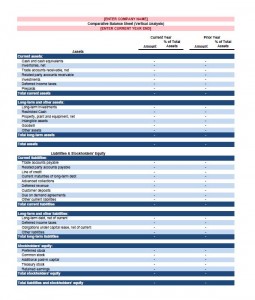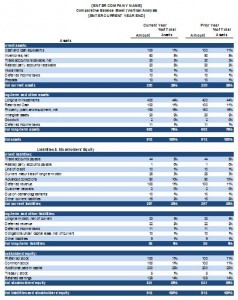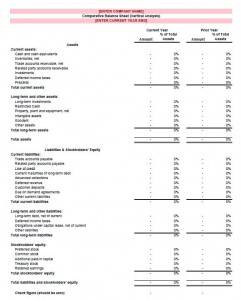Is your balance sheet in need of a make over? This balance sheet template comes complete with common balance sheet line items. It’s simply easier to start with more than you need and delete the items not applicable to your business. Plus, you’ll find notes containing helpful tips on many of line items. To top it all off you can use this balance sheet template to perform a vertical analysis.
Balance Sheet Template
System Requirements & Download
Balance Sheet Comparative Download
Download 53.50 KB 7179 downloads
More Information on the Balance Sheet Vertical Analysis Template
The Balance Sheet, also known as the statement of financial position, reflects the assets, liabilities, and equity of an entity. Commonly used to check Working Capital – business owners and/or investors often spend substantial time analyzing the balance sheet as many performance measures including the overall financial stability of an entity can be evaluated using this statement.
The easiest way to understand a balance sheet is to understand that:
- A balance sheet represents a snapshot in time; unlike an income statement which is accumulates transactions (or activity) over a time, the balance sheet presents information as of a specific date. For example, the line item cash is the amount of cash the company has on the date the balance sheet is presented.
- Generally, a balance sheet will show separate classifications for current assets and current liabilities, such balance sheets are referred to as a classified balance sheet (a classified balance sheet is what has been used in the template on this site)
Current Assets – Generally speaking, a period of 1 year is used to decide the classification of an asset as current. Deviation is permitted if the entities operating cycle is greater than 1 year; however, if the operating cycle is not clear use 1 year.
Current Liabilities – As with Current Assets, the 1 year time period is used. Items included within current liabilities are amounts known or estimated that will need expenditure to satisfy such obligations.
Long-term – Assets and liabilities not meeting the definition of current should be reflected as long-term (i.e., outside of the current classification).
Features Included in this Template
This balance sheet template includes the following features designed to increase efficiency and enhance professionalism:
- Dynamic formulas utilizing the offset function
- Conditional formatting for data entry – notice at the top of the picture above, the pink highlights, this is data that needs to be completed.
- Check figure at the bottom of the balance sheet to ensure it actually balances; if it doesn’t it will turn red and show you the difference.
- Setup to print on a single page; print settings may need to be adjusted if data is added.
Balance Sheet Vertical Analysis (clean)
Looking for a balance sheet vertical analysis without alternating row highlighting? Download this version:Balance Sheet Vertical Analysis (Quarterly)
Download this balance sheet with columns setup to perform a vertical analysis using quarter end data. Note, this template is setup as an example. The facts and circumstances surrounding individual transactions will dictate how and where those transactions are classified.Other Helpful Templates
Download a income statement template here.
Download a statement of cash flow template – this template helps in the creation of a statement of cash flows.
Evaluate your financials with this EBITDA & financial leverage template.



